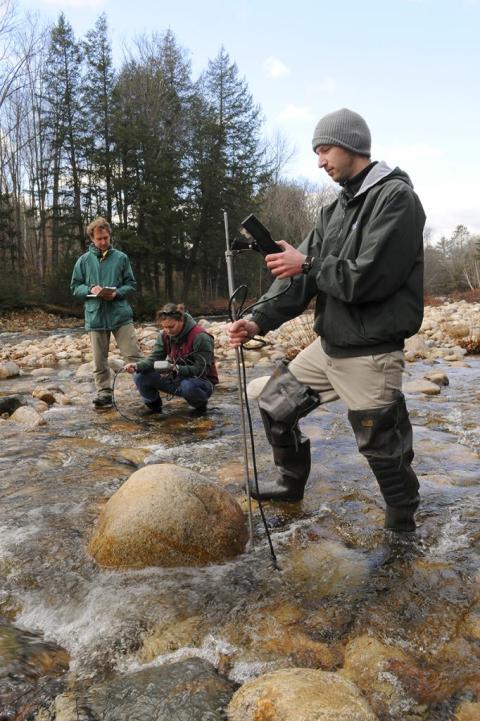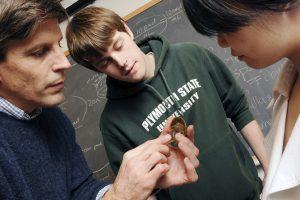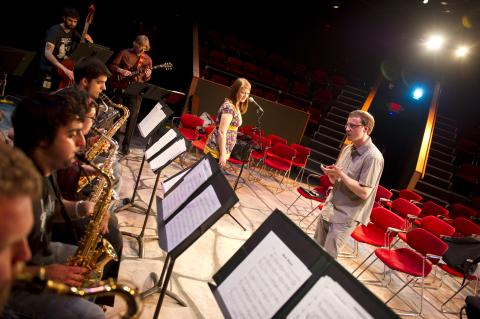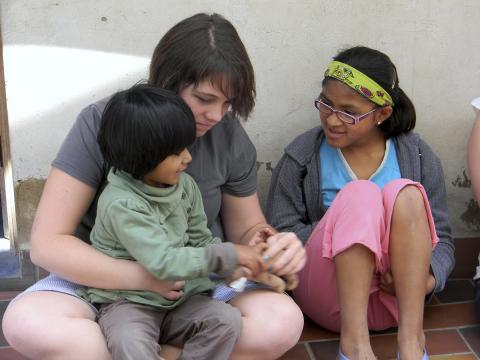Engaged Campus, Engaged Community

Plymouth State University has been engaged in a detailed and thoughtful strategic planning process. Focus 2020 emerged from a series of inclusive campus activities that took place during Academic Years 2012-2014. These activities included a SWOT analysis conducted during spring 2012 and open campus forums held during fall 2012. The members of the Cabinet were consulted, information was provided to Department Chairs for feedback, and members of the Planning and Budgeting Leadership Group (PBLG) gathered, organized, and refined all of the recommendations and worked together through the fall and early winter of 2013-2014 to generate a draft document. This document was then vetted across campus during the spring of 2014 via all-campus forums as well as a written feedback survey, and the final draft was approved by the Planning and Budgeting Leadership Group and the President’s Cabinet in May 2014. It has now been shared with the Board of Trustees.
This plan, called Focus 2020 because of its focus on future goal measurement and achievement, is guided and informed by the Plymouth State University Mission in place during 2012-14 and has been created to support future planning by the PSU community. The plan is designed to cover a six-year period, with the intention that subsequent plans will be developed on a five-year cycle to ensure that we have a solid strategic plan in place during PSU’s institutional accreditation processes that occur every five years. We will be able to refer to a living document through our next institutional accreditation, and then use information from our next self-study to inform the following plan. This document should be referenced as future efforts are undertaken at PSU over the next six years, inclusive of all areas, graduate and undergraduate.
Mission

PSU’s official mission statement as New Hampshire’s public regional comprehensive university, approved by the Board of Trustees, reads:
Plymouth State University serves the state of New Hampshire and New England by providing well-educated graduates; by offering ongoing opportunities for graduate education and professional development; and by extending to communities partnership opportunities for cultural enrichment and economic development. In each of these roles, Plymouth State University has a special commitment of service to the North Country and Lakes Region of New Hampshire.
Mission is an active verb. In distinguishing itself, PSU also has a working mission statement:
Plymouth State University distinguishes itself as a vibrant public university engaged in innovative teaching and research and enhancing the wellbeing of the region through dynamic partnerships for cultural enrichment and economic development.
Plymouth State University will be the university of choice for talented students who want high-quality, high impact liberal arts and professional programs that prepare students to succeed in the global arena and professional world. Plymouth State provides:
- Academic excellence where students work closely with faculty mentors, receiving a personalized education that includes opportunities for hands-on, experiential learning inside and outside of the class;
- Research, scholarship, and creativity in which faculty and graduate students involve undergraduate students in solving real-world problems and engaging in outreach;
- Enriched character-building and transformational experiences on the residential campus, as well as increased use of technology in all coursework and through delivery that enhances access and high-impact learning for students;
- A variety of master’s degree programs and selected professional doctorates;
- A culture of service and engagement where organizations, communities, and institutions are eager to form productive partnerships, enabling PSU to do good work and provide experiential opportunities for students.
Goals
Goals communicate a future state that the PSU community aspires to reach fully as an organization. Each goal is presented in a narrative form, and is followed by a list of action items.
PSU will provide each and every student with an engaging and valuable educational experience that promotes post-graduate success.

PSU will:
- Ensure a relevant, rigorous, reflective curriculum, utilizing research and outcomes-based assessment systems to inform planning and implementation
- Engage faculty who are excellent teachers, mentors, and experts in their fields
- Implement and support programs and services that enhance student success
- Improve physical and technological infrastructure to optimize learning and living environments and remain a campus of place
Every PSU community member shares in the responsibility to provide a rich and supportive experience that attracts well-qualified students and ensures their retention and timely graduation.

PSU will:
- Employ progressive regional, national, and international marketing, recruitment, and enrollment strategies
- Implement a comprehensive financial aid leveraging model
- Apply educational and financial practices that maximize retention through graduation
- Optimize time to graduation
- Cultivate holistic advising and mentoring relationships with each and every student
- Emphasize the role of every employee as an educator and a liaison for student success
Ut Prosim: PSU will live its commitment to service, community partnerships and environmental sustainability.

PSU will:
- Support and encourage students, faculty and staff to engage in service locally, nationally, and internationally
- Exemplify a commitment to service, citizenship, leadership and character development in its faculty and staff and cultivate the same in its students
- Continue to implement, assess, and update the University’s Climate Action Plan
PSU will recruit and retain a more diverse student body, faculty and staff.

PSU will:
- Strengthen recruitment of diverse students, faculty, and staff
- Foster an inclusive person-to-person and campus community
- Cultivate a sense of place and belonging for each member of the campus community
PSU will distinguish itself as a holistic health and wellness-centered environment.

PSU will:
- Encourage healthy behaviors in students, faculty and staff, creating a culture of holistic wellness
- Ensure that a healthy work/life balance can be achieved by students
- Serve as a health and wellness resource for the region through education, research, and programming
PSU is committed to financial sustainability.

PSU will:
- Ensure a competitive cost of attendance by controlling the cost of operations and implementing innovations that improve organizational effectiveness
- Invest responsibly in technical infrastructure to meet goals and move the University forward
- Ensure that the University’s initiative expectations efficiently align with resource capacity
- Seek targets of opportunity and analyze their respective financial impacts
- Diversify revenue and increase University resources through expanded development activities, grant writing efforts, private support and alternative uses of University resources
- Enhance and optimize physical infrastructure, technology, and facilities to meet the needs of this century
- Promote campus-wide understanding of the University budget
PSU will deepen alumni engagement, foster a culture of philanthropy, and grow private financial support for the University.

PSU will:
- Foster a program of ongoing communication with alumni
- Celebrate the accomplishments and success stories of alumni
- Inspire alumni to be active and engaged ambassadors of the University
- Promote personal philanthropy as a fulfilling way to support the mission, vision and values of PSU
- Increase alumni and friend participation in the Annual Fund and other gift programs
- Invest in the resources required to develop private support as a vital revenue stream
- Increase alumni and friends’ understanding of their roles in the University’s future
Appendix
Plymouth State University has a long tradition of meeting the evolving educational needs of the New Hampshire and New England community. Established in 1871 as Plymouth Normal School, the institution became Plymouth Teacher’s College in 1939, Plymouth State College in 1963, and Plymouth State University in 2003. A founding member of the University System of New Hampshire, Plymouth State now serves New Hampshire and the New England region as a comprehensive institution of higher education. The University confers bachelor’s and master’s degrees, certificates of advanced graduate studies, and selected professional doctorates. Professional outreach activities and graduate courses are offered at satellite locations throughout the state, and articulation agreements with other campuses of the University System and with the Community College System of New Hampshire offer a variety of program and transfer opportunities. The University also contributes directly to the ongoing academic and cultural life of the region by providing a variety of continuing education programs, concerts and theater performances, museum and art exhibits, and the athletic events of 24 varsity sports. PSU’s attractive residential campus of wide greens, tree-lined walkways, and traditional brick and clapboard buildings with an array of towers is located in the White Mountains and Lakes Region of New Hampshire, a pristine rural setting of great natural beauty and with multiple outdoor recreational opportunities within easy access of the New England region.
The University motto Ut Prosim, (That I May Serve), underscores the values upon which the Plymouth State University mission is built. These values are supported by the faculty, staff, and administration through a commitment to excellent teaching based on scholarship, research and creative endeavor; active involvement in University activities; and service to the wider community. Plymouth State University emphasizes sustainability. The University creates an environment that supports diversity, equity, and inclusiveness for the entire community and actively prepares students to participate respectfully and responsibly in a pluralistic society. Plymouth State University is committed to providing the best possible educational programming and therefore strives for continuous program improvement through comprehensive institutional assessment.
The educational philosophy of the University is based on academic excellence, learner-centered teaching, experiential learning, applied research, regional service, and leadership. The Plymouth State University education experience features a complementary relationship between liberal arts and professional studies, between academic and professional development, between service and individual growth, and between the University campus and the larger community.
During the plan’s drafting process, a set of guiding principles emerged as unifying themes threading throughout the goals. These principles are not goals themselves but a set of behavioral guidelines that will be used to guide decision-making, ground the University’s activities with focus and purpose, and aim toward successful achievement of PSU’s goals. In order for PSU to thrive in the future, the campus community must be a healthy, high-functioning culture. These principles are designed to help maintain and foster this culture.
- Prioritize activities that support students’ educational experiences.
- PSU will strive to provide each student with a high-quality learning experience both inside and out of the classroom and consistent access to developmentally appropriate support services; fund facilities that offer access to necessary (physical & virtual) resources & technology; and provide faculty and staff with professional development opportunities and compensation that result in high-quality teaching & scholarship.
- Promote and practice the resource stewardship necessary for PSU to thrive.
- PSU will be aware of and proactively respond to opportunities and threats, both internal and external.
- Sustain a culture of collaboration, open communication, transparency, respect and trust.
- PSU will ensure that information and data about the organization must be consistently communicated and easily accessible.
- Use measurable goals and data to drive decision-making.
- PSU believes goals must be measurable, clearly communicated, progress evaluated and benchmarks updated, providing faculty and staff with the tools and information needed to support decision-making, planning and accountability.
- Communicate a consistent, distinctive institutional identity.
- PSU will establish and promote an identity that communicates that PSU is a singular place academically, physically, and environmentally, clarifying what distinguishes PSU from other universities.
When students graduate or complete a certificate from PSU, they will:
- Possess an increased level of critical thinking skills
- Understand the interconnectedness and value of an inclusive community
- Possess mastery of their content area
- Be able to communicate effectively through a variety of media
- Be prepared for career advancement
- Integrate the motto of Ut Prosim within their lives
- Be enthusiastic advocates for and representatives of Plymouth State University

